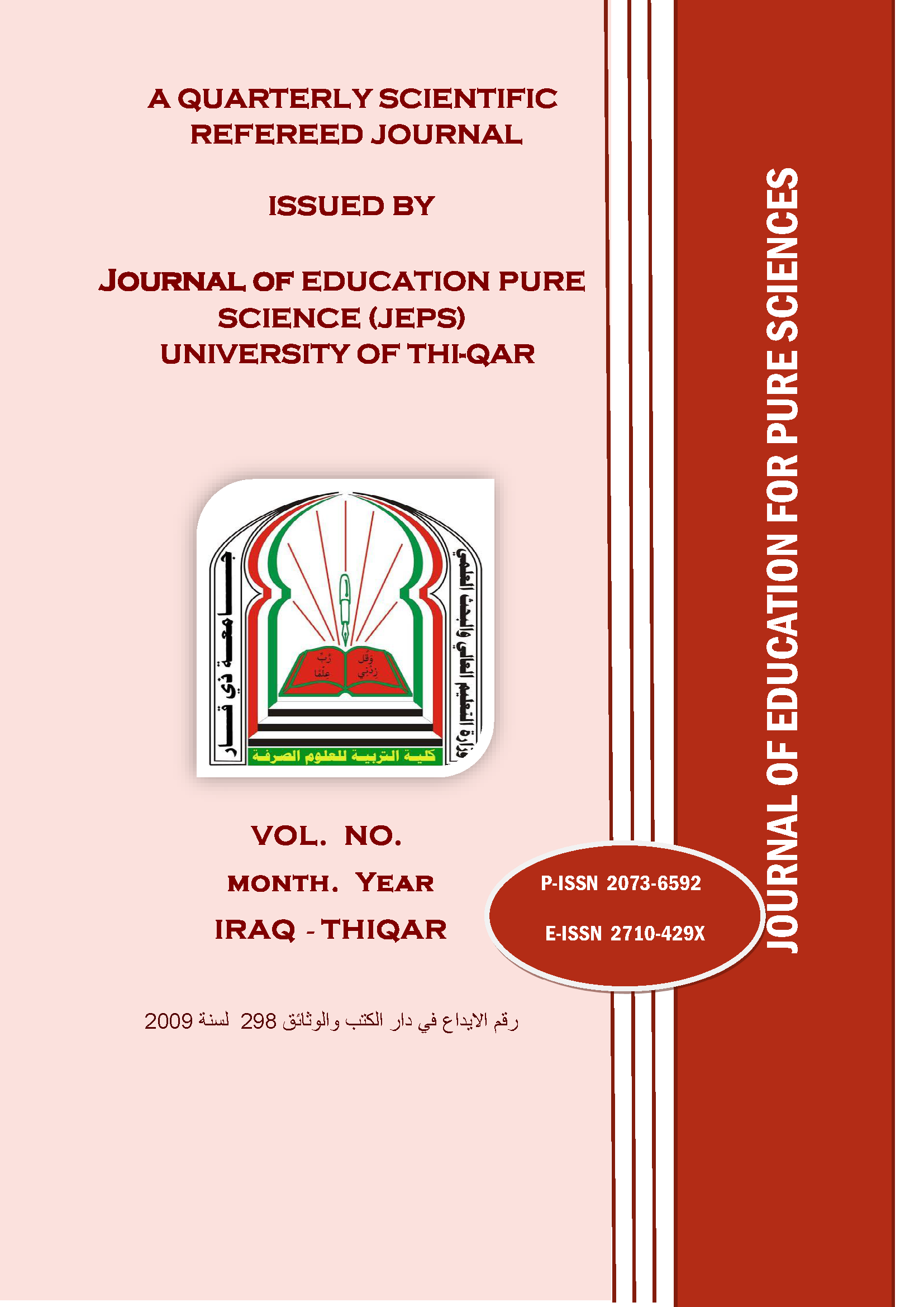The Role of Adiponectin Hormone and some Biochemical Parameters in Women with Invasive Ductal Carcinoma of the Breast in Thi-Qar Province-Iraq
DOI:
https://doi.org/10.32792/jeps.v11i2.119الكلمات المفتاحية:
Breast cancer، Invasive ductal carcinoma، Adiponectin hormone، Vitamin D3، Calcium، Alkaline phosphatase، and inflammatory marker C- reactive proteinالملخص
Breast cancer is the most frequently diagnosed cancer and is a common cause of cancer related death in women, accounting for 25% of cancer cases and 15% of cancer-related deaths worldwide The present study was designed to determine and compare the levels of Adiponectin hormone, Vitamin D3, Calcium, Alkaline phosphatase, and C- reactive protein among women with Invasive ductal carcinoma &healthy individuals. The study was designed to determine and compare the levels of serum Adiponectin hormone, Vitamin D3, Calcium, Alkaline phosphatase, and C- reactive protein levels were measured in eighty -five patient’s Invasive ductal carcinoma and seventy-five supposed healthy subjects. The levels of serum Adiponectin hormone, Vitamin D3, were reveled significant decrease among patients with Invasive ductal carcinoma as compared to control group whereas the levels of Calcium, Alkaline phosphatase, and C- reactive protein showed a significant increase in Invasive ductal carcinoma patients in comparison to control subjects (P ≤ 0.05). This present study indicated that low blood adiponectin level was associated with the risk of obesityrelated malignancies, including breast cancer, we can conclude that deficient of vit. D3 may contribute to the process of carcinogenesis among the breast cancer patients, and our findings revealed significant in Calcium, Alkaline phosphatase, and C- reactive protein levels among patients with Invasive ductal carcinoma
المراجع
REFERENCES: ♦ Ahmed S.D1., Khanam A., Sultan N., Idrees F., and Akhter N. (2015). Serum Adiponectin Level Association with Breast Cancer Risk: Evidence from a Case- Control Study,Asian Pac J Cancer Prev. 2015;16(12):4945-8. ♦ Allin K.H. , Nordestgaard B.G., Flyger H., Bojesen S.E.( 2011). Elevated pre-treatment levels of plasma C-reactive protein are associated with poor prognosis after breast cancer: a cohort study. Breast Cancer Res ; 13(3):R55. ♦ Balasubramanian S.M. and Rotti S.B. (2013).Risk factors of female breast carcinoma: a case control study at Puduchery. Indian J Cancer ;50:65e70. ♦ Chlebowski R.T., Chen Z., Anderson GL., Rohan T., Aragaki A., et al. (2005). Ethnicity and breast cancer: factors influencing differences in incidence and outcome, J Natl Cancer Inst 97: 439–448. ♦ Dickinson H.O., Nicolson D.J., Campbell F., Cook J.V., Beyer F.R., and Ford G.A.( 2006). Magnesium supplementation for the management of essential hypertension in adults. Cochrane Database Syst Rev; 3: CD004640. ♦ Dillon D.A., Guidi A.J., and Schnitt S.J.(2010). Chapter 28: Pathology of Invasive breast Cancer, in Harris JR, Lippman ME, Morrow M, Osborne CK. Disease of the Breast, 4th edition, Lippincott Williams and Wilkins. ♦ Fu Y., Luo N., Klein R.L, and Garvey W.T. (2005). Adiponectin promotes adipocyte differentiation, insulin sensitivity, and lipid accumulation, J Lipid Res, 46: 1369-79. ♦ Guo L., Liu S., and Zhang S. ( 2015). “C-reactive protein and risk of breast cancer: a systematic review and meta-analysis,” Scientific Reports, vol. 5, Article ID10508.
♦ Hadeel R. F., Husam M. K., Maha S. H.(2019). Clinical Study of the Serotonin, Melatonin, Estradiol, and Adiponectin Hormones in Women with Breast Cancer in Thi – Qar Governorate – Iraq. International Journal of Pharmaceutical Quality Assurance ; 10(1); 151-155. ♦ Haluzik M., Parizkova J., and Haluzik M.M. (2004). Adiponectin and its role in the obesity-related insulin resistance and relatedcomplications, Physiol Res, 53: 123- 9. ♦ Hoey R.P., Sanderson C., Iddon J., Brady G., Bundred N.J., and Anderson N.G.(2003). The parathyroid hormone-related protein receptor is expressed in breast cancer bone metastases and promotes autocrine proliferation in breast carcinoma cells. Br J Cancer ; 88: 567-73. ♦ Ijaz A., Mehmood T., Qureshi A.H., Anwar M., Dilawar M., Hussain I., Khan F.A. , Khan D.A. , Hussain S. , and Khan I.A.(2006). Estimation of ionized calcium, total calcium and albumin corrected calcium for the diagnosis of hypercalcemia of malignancy. J. Coll Physicians Surg Pak.; 16(1):49-52. ♦ McCullough M.L., Rodriguez C., Diver W.R., Feigelson H.S., Stevens V.L., Thun M.J., Calle E.E.(2005). Dairy, calcium, and vitamin D intake and postmenopausal breast cancer risk in the Cancer Prevention Study II Nutrition Cohort. Cancer Epidemiol Biomarkers Prev;14:2898 – 904. ♦ Merajver S.D., Iniesta M.D., and Sabel M.S.( 2010). Chapter 62: Inflamatory Breast Cancer, in Harris JR, Lippman ME, Morrow M
التنزيلات
منشور
إصدار
القسم
الرخصة
The Authors understand that, the copyright of the articles shall be assigned to Journal of education for Pure Science (JEPS), University of Thi-Qar as publisher of the journal.
Copyright encompasses exclusive rights to reproduce and deliver the article in all form and media, including reprints, photographs, microfilms and any other similar reproductions, as well as translations. The reproduction of any part of this journal, its storage in databases and its transmission by any form or media, such as electronic, electrostatic and mechanical copies, photocopies, recordings, magnetic media, etc. , will be allowed only with a written permission from Journal of education for Pure Science (JEPS), University of Thi-Qar.
Journal of education for Pure Science (JEPS), University of Thi-Qar, the Editors and the Advisory International Editorial Board make every effort to ensure that no wrong or misleading data, opinions or statements be published in the journal. In any way, the contents of the articles and advertisements published in the Journal of education for Pure Science (JEPS), University of Thi-Qar are sole and exclusive responsibility of their respective authors and advertisers.




